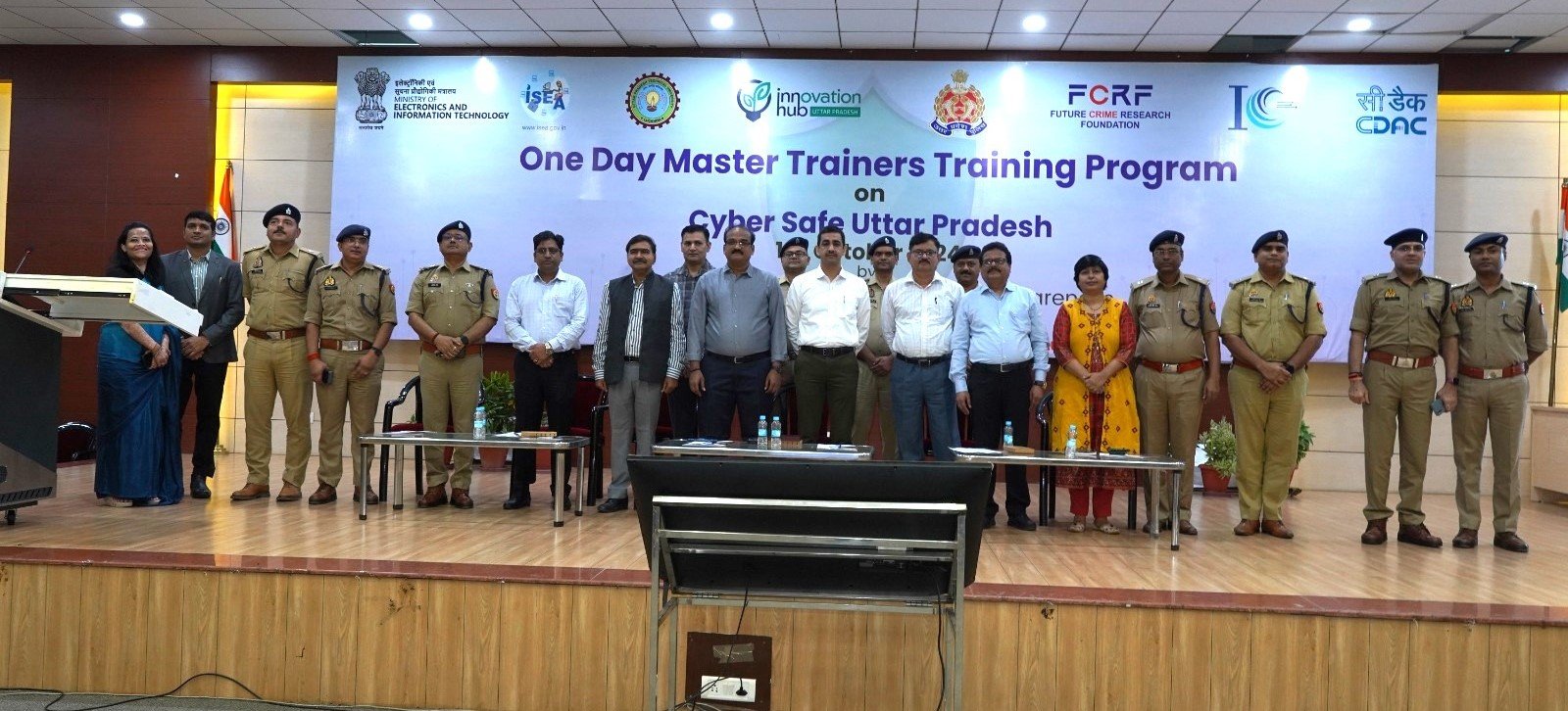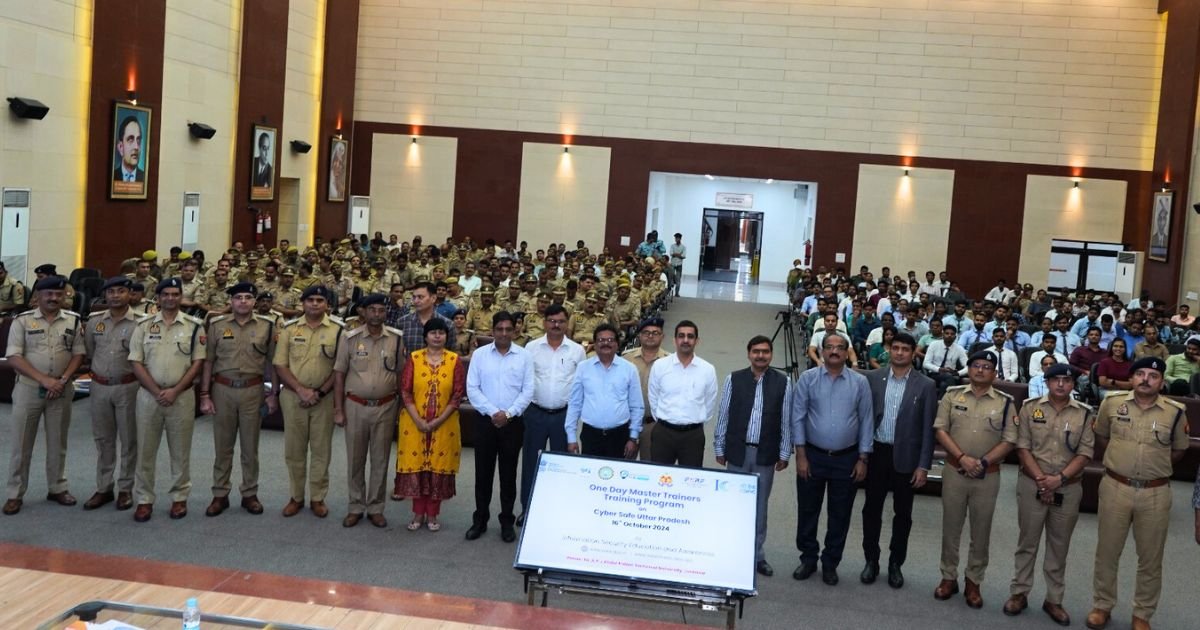Lucknow – The growing menace of cybercrime and the urgent need for enhanced digital safety were addressed head-on during the first day of the Cyber Safe Uttar Pradesh event, a two-day program jointly organised by ISEA program of Ministry of Electronics and Information Technology (MeitY), Future Crime Research Foundation (FCRF), Uttar Pradesh Police, Dr. A.P.J. Abdul Kalam Technical University (AKTU), Indian Cyber Crime Coordination Centre (I4C) and Innovation Hub,UP (AKTU).
The event, which kicked off at Dr. A.P.J. Abdul Kalam Technical University (AKTU), Lucknow, on Wednesday, October 16, 2024, aims to raise awareness and equip stakeholders with the tools to tackle cyber threats.
The second day of the event, scheduled for October 17 at Indira Gandhi Pratisthan, will feature masterclasses and mass awareness sessions. The program’s impact is expected to ripple across Uttar Pradesh, as trained participants will disseminate the knowledge they’ve gained to others in their communities.
Masterclass for Policemen: A Key Highlight
One of the most important elements of day one was the masterclass attended by over 200 policemen from various districts across Uttar Pradesh. These law enforcement officers, specially chosen for their roles in combating cybercrime, received advanced training on the latest threats in the digital world and practical strategies to address them. After the event, these officers will return to their respective districts and pass on the training to their colleagues, creating a multiplier effect that will strengthen cybercrime prevention across the state.
Fostering Cyber Awareness: Key Sessions and Workshops
The Cyber Safe Uttar Pradesh event brought together an impressive array of experts from the fields of law enforcement, academia, and the cybersecurity industry. Esteemed guests and speakers included:
- Pawan Kumar, DIG-Cyber Crime, Uttar Pradesh
- Prof. Jai Prakash Pandey, Vice-Chancellor, AKTU
- Prof. Triveni Singh, former IPS Officer and Chief Mentor, FCRF
- Rajesh Kumar Yadav, SP-Cyber Crime
- M Jagadish Babu, Project Manager, ISEA (Information Security Education and Awareness Program)
These individuals played a critical role in shaping the agenda and guiding the discussions, which were designed to foster a deeper understanding of cyber threats and ways to mitigate them.

“As per the latest report, cybercrime is projected to cost the world $8 trillion USD in 2023. If measured as a country, cybercrime would be the world’s third-largest economy after the U.S. and China. Cybercrime costs are double that of the Indian economy, highlighting the massive scale and magnitude of the problem,” said Pawan Kumar, DIG-Cyber Crime, Uttar Pradesh.
He also emphasized that while cybercrime cases are typically investigated by a three-star officer or an inspector or above, in Uttar Pradesh, there are only 5,000 officers responsible for both cybercrime and maintaining overall law and order
Emerging Cybercrime in Digital Landscapes
Led by Rajesh Kumar Yadav and Prof. Triveni Singh, this session explored the constantly evolving landscape of cybercrime and its profound impact on individuals and businesses alike. The speakers discussed pressing issues such as identity theft, ransomware attacks, phishing scams, and other forms of online fraud. They also shared strategies for individuals and organizations to safeguard against these ever-growing threats, emphasizing the importance of staying informed and adopting preventive measures.
Cyber Hygiene Practices: A Key to Digital Safety
One of the foundational aspects of the event was the focus on cyber hygiene—the basic steps individuals and organizations can take to protect themselves in the digital world. M Jagadish Babu, Project Manager of ISEA, led an insightful session on best practices, ranging from using strong passwords and two-factor authentication to regularly updating software and recognizing phishing attempts. By promoting cyber hygiene, the program aimed to instill habits that will help reduce the risk of cyberattacks and data breaches.
Open Discussions and Collaborative Solutions
The event was not limited to lectures and presentations—open discussion sessions were a significant part of the program, allowing participants to ask questions, share their experiences, and engage directly with the experts. These interactions provided a platform for knowledge exchange, where attendees could raise concerns, clarify doubts, and offer their perspectives on how to combat the growing cybercrime problem in their communities.
The goal of these discussions was to create a collaborative environment where everyone—from cybersecurity professionals to community leaders—could come together to develop and implement effective solutions for tackling cybercrime. By sharing both personal and professional insights, participants were able to gain a more nuanced understanding of the challenges they face and the strategies they can employ.
Preparing for Day Two: Expanding the Reach of Cyber Safety
The second day of the Cyber Safe Uttar Pradesh event, scheduled for October 17, will continue the momentum built on day one with further training and awareness activities at Indira Gandhi Pratisthan, Lucknow.
These activities will further emphasize the importance of a holistic approach to cybersecurity, encouraging active participation from various sectors of society, including law enforcement, businesses, schools, and local communities.
A Joint Effort to Build a Cyber-Safe Uttar Pradesh
This initiative, spearheaded by FCRF and supported by MeitY, reflects the state’s commitment to making Uttar Pradesh a cyber-safe region. By raising awareness, promoting responsible digital practices, and providing hands-on training, the program aims to reduce the risk of cybercrime and create a more secure digital environment.
With cybercrime continuing to rise globally, events like Cyber Safe Uttar Pradesh serve as essential stepping stones toward ensuring the safety of citizens in the digital age. The combination of expert insights, practical training, and collaborative discussions promises to leave a lasting impact on participants, who will carry the lessons learned back to their respective districts and communities.


